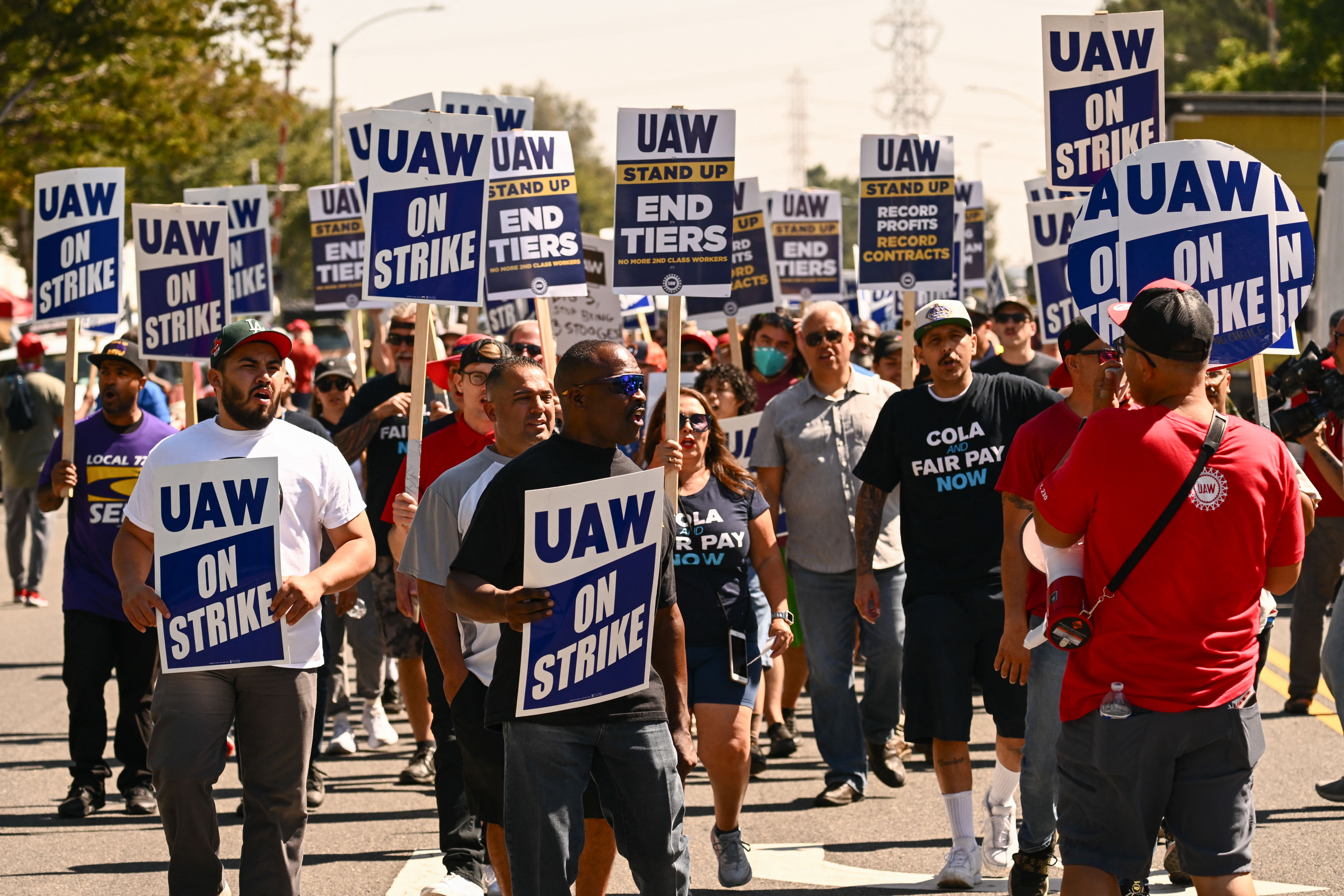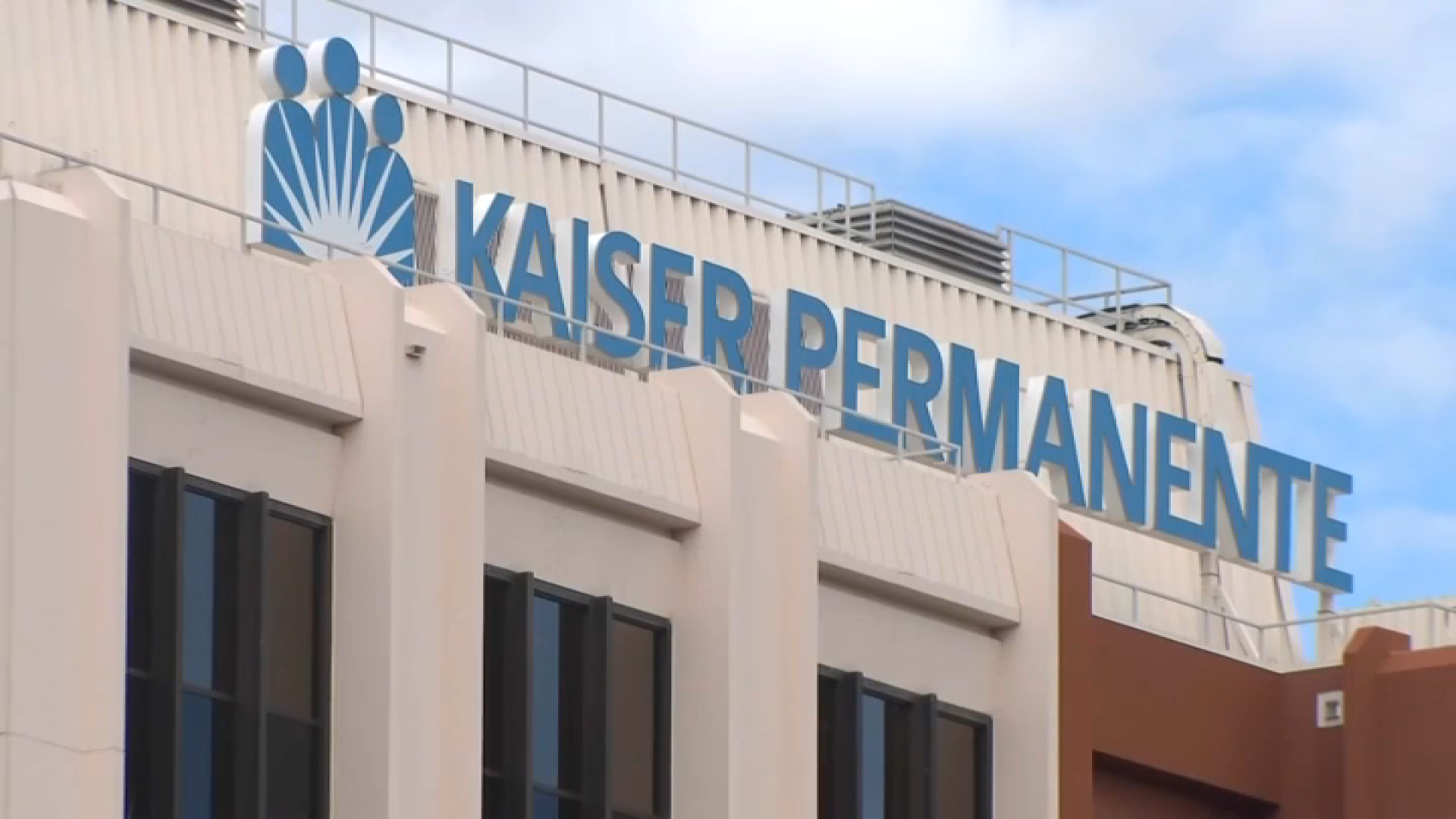Roughly 19,000 Bay Area Kaiser Permanente workers joined tens of thousands of their colleagues around the country on the picket lines Wednesday in what their union is calling the nation's largest ever health care worker strike.
Starting at 6 a.m., 75,000 members of the Service Employees International Union-United Healthcare Workers West and aligned unions walked off the job in five states and Washington, D.C., after negotiators failed to reach a last-minute contract agreement.
"Healthcare workers are taking the work action to protest Kaiser executives' bad faith bargaining, which is getting in the way of finding solutions to solve the Kaiser short-staffing crisis by investing in its workforce," union officials said in a news release.
"In recent days, Kaiser executives maintaining aggressive threats of outsourcing became a sticking point in negotiations, especially at a time when the company is failing to retain key employees," union officials said.
The strike is expected to last for three days unless the two sides reach a deal, and is impacting Kaiser hospitals and clinics in California, Virginia, Colorado, Washington, Oregon and Washington, D.C.
In addition to the SEIU-UHW workers, two other local unions representing roughly 14,000 members — Engineers and Scientists of California Local 20 and Office and Professional Employees International Union Local 29 — have authorized a sympathy strike.
SEIU-UHW officials have said that the health care giant is proposing to cut workers' performance bonuses, make it easier to outsource jobs to "low-wage, for-profit companies" and has failed to provide wages that keep up with inflation, among other things, according to the union.
Kaiser disputes many of the union's claims and said that it is offering across the board wage increases, a company-wide minimum wage starting at $21 an hour — the union is asking for $26 — and continuing health benefits and retirement plans, among other things.
Get a weekly recap of the latest San Francisco Bay Area housing news. Sign up for NBC Bay Area’s Housing Deconstructed newsletter.
Kaiser officials said they have spent millions on staff development and training, accelerated the rate of hiring and are offering across-the-board wage increases of between 10 and 14 percent over four years.
"Both Kaiser Permanente management and Coalition union representatives are still at the bargaining table, having worked through the night in an effort to reach an agreement," Kaiser officials said Wednesday. "There has been a lot of progress, with agreements reached on several specific proposals late Tuesday."
The strike doesn't involve the Kaiser nurses' union or doctors and the company said hospitals and emergency departments will remain open, along with hospital pharmacies and critical infusion services.
Some outpatient pharmacies, laboratory, radiology and optical locations will be closed or operate with reduced hours.
People are encouraged to schedule appointments online at kp.org or by using the KP mobile app.
Patients with urgent needs for laboratory, radiology or optical services can call 866-454-8855.
The striking workers include licensed vocational nurses, emergency department technicians, radiology technicians, ultrasound sonographers, teleservice representatives and respiratory therapists, among others.
Kaiser also sent the following statement on Wednesday afternoon:
While we have not reached a contract settlement, we have been able to reach a number of tentative agreements in bargaining, and our offers to date address the unions’ priorities, including:
- Across-the-board wage increases in all markets over the next four years.
- Updating the Performance Sharing Plan to include a minimum payout opportunity and potential for up to a $3,750 payout.
- Offering minimum wages of $23/hour in California and $21/hour in markets outside of California.
- Continuing and enhancing our existing excellent health benefits and retirement income plans.
- Renewing our strong tuition assistance and training programs, and increasing funding of the education trusts.
We remain committed to reaching a new agreement that continues to provide our employees with market-leading wages, excellent benefits, generous retirement income plans, and valuable professional development opportunities.
Together, we have faced the toughest challenges over the past three years. Kaiser Permanente, our industry, and our employees are now operating in a new cultural, labor, and post-pandemic environment that we are all working hard to understand. We are committed to finding workable solutions for this new environment that meet our responsibility to balance taking care of our employees and being affordable to our members.
We will coordinate with Coalition leaders to reconvene bargaining as soon as possible. We will work hard to reach an agreement so that together, we can all return to delivering on the mission of Kaiser Permanente for the benefit of our members, patients, employees, physicians, customers, and communities.
Meeting our shared staffing goal
On the same day that the Coalition strikes began, we’re pleased to confirm that we’ve met our goal of hiring 10,000 new Coalition-represented employees by year-end – and it is only October 4th. We’re not done yet. We are committed to addressing every area of staffing that is still challenging.
As a reminder: In April we agreed with the Coalition to a joint goal of hiring 10,000 people by the end of this year into jobs the Coalition cares about. We agreed this would be a great success if we could hire that many people into Coalition roles by the end of this year. We hit the goal three months early.
In total over the past two years, Kaiser Permanente has hired more than 50,000 people to join our teams.
Meeting our members’ needs
The health and wellbeing of our members and patients is our top priority. Because we are such a large organization, with multiple ways that members can access care, the impact of the strike is different at various locations.
We have robust plans in place to ensure members continue to receive safe, high-quality care during the strike.
All our hospitals and emergency departments remain open. Our facilities will continue to be staffed by our physicians, trained and experienced managers, and our great staff. Thousands of qualified and trained contract staff are joining our Kaiser Permanente teams this week as well, to help meet our members’ and patients’ needs. We thank those Coalition-represented employees who have chosen to come to work and care for our patients, members, and communities.
Members who need urgent or timely medical care should continue to seek it at our hospitals and medical facilities. A strike should not dissuade anyone from seeking necessary care.
We will contact members affected by any necessary changes in our services. We may need to reschedule non-emergency and elective services in some locations out of an abundance of caution. Our members can follow any important updates to our care delivery on kp.org.



